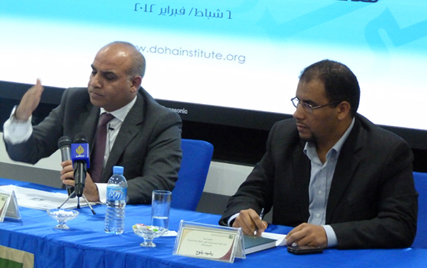
The ACRPS hosted a lecture by Dr Mahjoob Zweiri, Head of the School of Humanities at Qatar University and former head of Iranian studies at the UK's Durham University. The speaker was introduced by ACRPS Assistant Researcher, who spoke of the importance of the topic at hand and mentioned the speaker's many publications in Arabic, Farsi and English.
Dr Zweiri, whose lecture was titled "Revolutionary Iran One Year After the Arab Revolutions: Notes on Iran's Foreign Policy and its Ramifications", began his discussion with the remark that the reaction of Iran to the Arab revolutions "was probably one of the most important questions facing the Arabs today". Dr Zweiri then went on to ask the question, "Did Iran's foreign policy change with the Arab revolutions?" To which the answer was a firm yes; Iranian decision-makers and the country's cultural and political elite, he went on to suggest, were very much caught off-guard by the revolutions sweeping through the Arab countries.
This surprise was due, he suggested, to a wide-spread cultural belief amongst Iranians. "To them", he said "revolutions within an Islamic context were the exclusive preserve of Shia Islam". It was also true, according to Dr Zweiri, that the Iranian view was that the Arab countries were held together by brutal and oppressive political elites who were brought propped up by foreign colonial powers-something which the Iranians, Dr Zweiri pointed out, did not see in themselves.
Zweiri further went on to describe in detail how the attitudes of the Iranian public and also the country's political decision-makers towards the Arab revolutions varied from country to country. He gave special mention to the large degree of attention paid by Iranians to the revolution a country which, despite it not having normal diplomatic relations with Iran for nearly 30 years, was felt by many Iranians to have a close affinity with their own country, and a fellow host of a great civilization. As such, they were both keenly interested in Egyptian affairs and buoyed by the revolution there.
In the case of Libya, while, again, the country under its previous regime did not enjoy a "healthy" friendship with Iran: this time due to the disappearance of Lebanese cleric Imam Musa Sadr, ostensibly in Libya. Nonetheless, the Iranians felt the ability to criticize the way the revolution there was handled, pointing out, in Iranian media coverage, how destructive the NATO bombardment had been. Zweiri also suggested that the Iranians were also behaving along sectarian lines in the case of Bahrain, but pointed out that Saudi Arabia's intervention on the small island helped provoke Iranian ire on this issue. Most of the lecture was then devoted to a more detailed discussion of the revolution underway in the Arab country which was most closely associated with Iran: Syria. Zweiri made clear throughout that the Iranian leadership was committed to ensuring that the Syrian regime would remain in place, but that Iran would find it difficult to achieve everything on its geostrategic plate at once, particularly if Russian support for the Assad regime proved, as he expected it would, less than steadfast.
Arguably the most important conclusion drawn by Zweiri, however, and the one with the most broad appeal, was the suggestion that Iran had now lost its moral superiority: it was no longer the country's only revolutionary regime. Moreover, such a fact would have an impact on Iran's own domestic political affairs, with the Iranian Green movement very much emboldened by the events in neighboring countries.